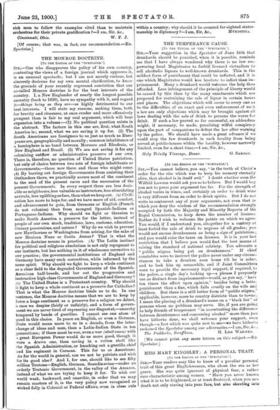THE MONROE DOCTRINE.
[TO THE EDITOR OF THE "SPECTATOR.") Six,—One who disapproves the policy of his own country, contesting the views of a foreign journal which approves it, is an unusual spectacle ; but I am not merely curious, but sincerely desirous for my own mental clarification, to know the grounds of your recently expressed conviction that our so-called Monroe doctrine is for the best interests of the country. I, a New Englander of nearly the longest possible ancestry (back to 1630), have no sympathy with it, and regard it—things being as they are—as highly detrimental to our best interests. I will state my reasons, making them, both for brevity and clearness, at once cruder and more offensively pungent than is fair to my real argument, which will bear expansion into a volume :—(1) No political question exists in the abstract. The factors in this one are, first, what South America is ; second, what we are saving it up for. (2) The South Americans are foreigners to us just as much as Euro- peans are, geographically and morally; common inhabitance of a hemisphere is no bond between Morocco and Rhodesia, or New England and Brazil. (3) We are not saving it for any colonising outflow or administrative preserve of our own. There is, therefore, no question of United States patriotism, but only of choice between two sets of foreign inhabitants or Governments,—those now there and those who might come. (4) By barring out foreign Governments from assisting their Outlanders there, we practically assure most of the continent to the seed of the present races and the succession of the present Governments. In every respect these are less desir- able as neighbours, less valuable as instructors, less stimulating as rivals, less uplifting as foes, than what we keep out. (a) Civili- sation has more to hope for, and we have more of aid, comfort, and advancement to gain, from Germans or English (French do not colonise) than from mongrel Spanish-Indians or Portuguese-Indians. Why should we fight or threaten to make South America a preserve for the latter, instead of people of our own stock, traditions, laws, customs, education, literary possessions, and nature P Why do we wish to prevent new Hawthornes or Washington from arising, for the sake of new Mexican Nuns or Santa Annas ? That is what the Monroe doctrine means in practice. (b) The Latin instinct for political and religious absolutism is not only repugnant to our instincts, but has nothing in it of wholesome corrective to our practice ; the governmental institutions of England and Germany have many such correctives, while informed by the same spirit. Why should we fight to keep a whole continent as a clear field to the degraded Governments of the Spanish- American half-breeds, and bar out the progressive and instructive high-class Governments of England and Germany ? (c) The United States is a Protestant country. Why should it fight to keep a whole continent as a preserve for Catholics ? That is what the Monroe doctrine binds us to do. In one sentence, the Monroe doctrine means that we are to keep by force a huge continent as a preserve for a religion we detest, a race we despise (fairly or unfairly), and a form of govern- ment we are never tired of expressing our disgust at—anarchy tempered by bands of guerillas. I cannot see one atom of good in this choice. In peace an English, or even a German, State would mean more to us in a decade, from the inter- change of ideas and men, than a Latin-Indian State in ten generations ; if there must be war, even a war (absit omen) with a great European Power would do us more good, though it were a drawn one, than caving in a rotten shell like the Spanish Administration, or knocking out a guerilla chief and his regiment in Caracas. This for us as Americans. As for the world in general, can we not be patriots and wish for its good also I' And I, for one, should like to see fifty million Teutons—English, German, Scandinavian—under an orderly Teutonic Government, in the valley of the Amazon, instead of what we are trying to keep it for. To wish our world weak, backward, and anarchic, in order that we may remain masters of it, is the very policy now recognised as wicked folly in Colonial or Federal affairs, even in class rule
within a country; why should it be counted far-sighted states-
manship in diplomacy P—I am, Sir, &O., MYRIEITIOA.


































 Previous page
Previous page